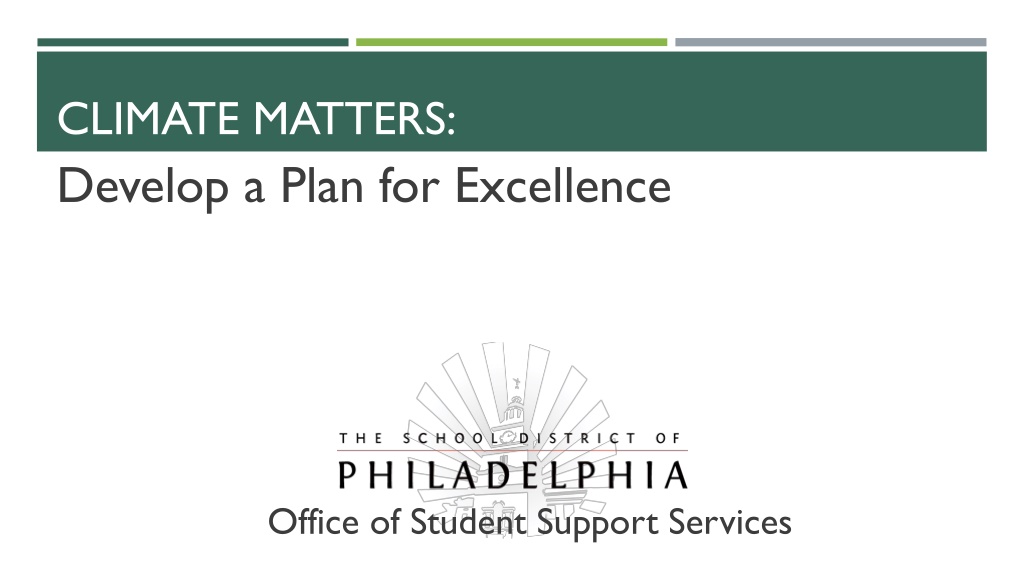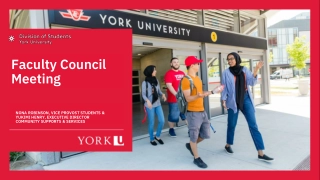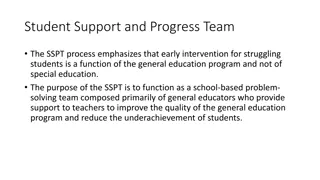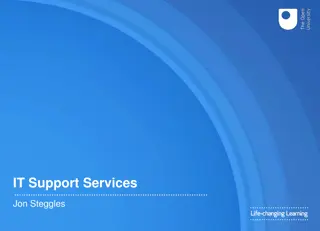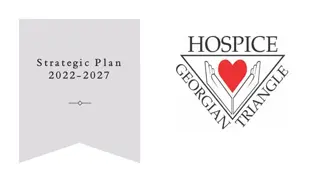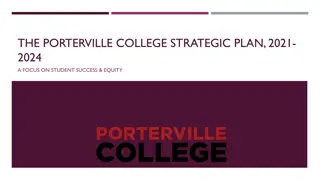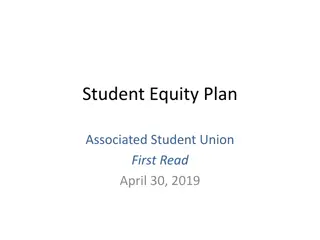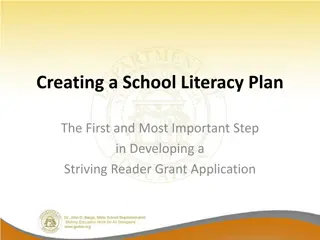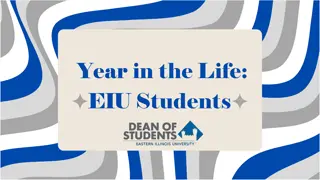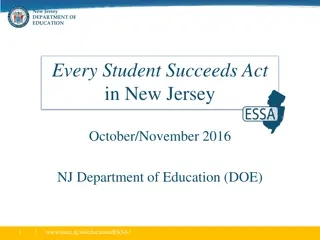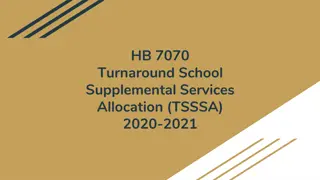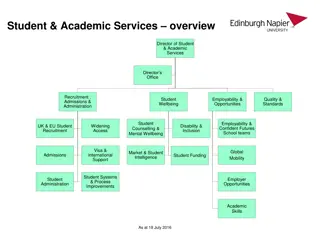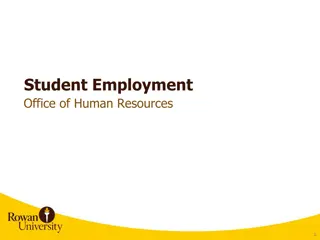Developing a Plan for Excellence: Office of Student Support Services
Dive into the "CLIMATE MATTERS: Develop a Plan for Excellence" program led by the Office of Student Support Services. Explore ice breaker activities, agenda details, group sessions, and topics like climate focus, data utilization, and case study reviews to enhance student support strategies effectively.
Download Presentation

Please find below an Image/Link to download the presentation.
The content on the website is provided AS IS for your information and personal use only. It may not be sold, licensed, or shared on other websites without obtaining consent from the author. Download presentation by click this link. If you encounter any issues during the download, it is possible that the publisher has removed the file from their server.
E N D
Presentation Transcript
CLIMATE MATTERS: Develop a Plan for Excellence Office of Student Support Services
ICE BREAKER BLANKET BALANCE How to Play Everyone must stand on the blanket: One foot down and one foot raised Hold for 3 seconds Fold the blanket and do it again We will tell you when to stop Can we stop now?
ICE BREAKER DEBRIEF How did you feel? What happened? How does this relate to MTSS?
AGENDA Ice breaker Norms Scope and Sequence What does the Triangle mean anyway? Climate, Data and 4 Focus Areas Intervention activity Close Out and What s Next
Elementary Group 1a Climate Focus Room B124 August 8 8:30 am 3:30 pm 1. Data: Where It Is and How to Use It 2. Developing Your Climate Plan 3. Lunch 4. Case Study Review: What Would You Do? 5. The Evidence-base and First Six Week Focus
Elementary Group 1b Climate Focus Room B203 August 8 8:30 am 3:30 pm 1. Developing Your Climate Plan 2. Data: Where It Is and How to Use It 3. Lunch 4. The Evidence-base and First Six Weeks 5. Case Study Review: What Would You Do?
Elementary Group 1c Climate Focus Room B202 August 8 8:30 am 3:30 pm 1. Case Study Review: What Would You Do? 2. The Evidence-base and First Six Weeks 3. Lunch 4. Data: Where It Is and How to Use It 5. Developing Your Climate Plan
Elementary Group 1d Climate Focus Room B204 August 8 8:30 am 3:30 pm 1. The Evidence-base and First Six Weeks 2. Case Study Review: What Would You Do? 3. Lunch 4. Developing Your Climate Plan 5. Data: Where It Is and How to Use It
Elementary Group 2a Climate Focus B124 August 10 8:30 am 3:30 pm 1. Data: Where It Is and How to Use It 2. Developing Your Climate Plan 3. Lunch 4. Case Study Review: What Would You Do? 5.The Evidence-base and First Six Week Focus
Elementary Group 2b Climate Focus B202 August 10 8:30 am 3:30 pm 1. Developing Your Climate Plan 2. Data: Where It Is and How to Use It 3. Lunch 4. The Evidence-base and First Six Weeks 5. Case Study Review: What Would You Do?
Elementary Group 2c Climate Focus B203 August 10 8:30 am 3:30 pm 1. Case Study Review: What Would You Do? 2. The Evidence-base and First Six Weeks 3. Lunch 4. Data: Where It Is and How to Use It 5. Developing Your Climate Plan
Elementary Group 2d Climate Focus B204 August 10 8:30 am 3:30 pm 1. The Evidence-base and First Six Weeks 2. Case Study Review: What Would You Do? 3. Lunch 4. Developing Your Climate Plan 5. Data: Where It Is and How to Use It
High/Middle School Group 3a Climate Focus B208 August 9 8:30 am 3:30 pm 1. Data: Where It Is and How to Use It 2. Developing Your Climate Plan 3. Lunch 4. Case Study Review: What Would You Do? 5. The Evidence Base and First Six Week Focus
High/Middle School Group 3b Climate Focus B209 August 9 8:30 am 3:30 pm 1. Developing Your Climate Plan 2. Data: Where It Is and How to Use It 3. Lunch 4. The Evidence-base and First Six Weeks 5. Case Study Review: What Would You Do?
High/Middle School Group 3c Climate Focus B218 August 9 8:30 am 3:30 pm 1. Case Study Review: What Would You Do? 2. The Evidence-base and First Six Weeks 3. Lunch 4. Data: Where It Is and How to Use It 5. Developing Your Climate Plan
High/Middle School Group 3d Climate Focus B219 August 9 8:30 am 3:30 pm 1. The Evidence-base and First Six Weeks 2. Case Study Review: What Would You Do? 3. Lunch 4. Developing Your Climate Plan 5. Data: Where It Is and How to Use It
DBH Continuum of Care School-Based Behavioral Health Program Trauma Focused Therapy Improved Outcomes: Disproportio n Suspension Attendance Behavior Wellness & Self-Regulation Social Emotional Learning Trauma Sensitivity Dropout Prevention Bullying Prevention Positive Impact on AG1, AG2 Check & Connect Check-In Check Out Social Skills Group Behavior Plans Positive Reinforcement Restorative Discipline Culturally Responsive, School-Wide, Social-Skills Instruction Classroom Management Trauma-Informed Practices
WHY CLIMATE MATTERS? Why aren t you more like Data? Data shows that climate interventions done with fidelity have a positive impact on AG1 and AG2 outcomes.
CLIMATE STRATEGIES IMPROVE: The 4 Key Indicators: Attendance Suspension Disproportionality Behavior
Anchor Goal 1 abbreviated logic model Long-term Outcomes Short-term Outcomes Activities Outputs Goal 9th grade academy Transition to high school Appropriate rostering Advanced coursework offerings Engagement Evidence-based 9th grade/high school interventions or theoretical grounding Credit accumulation On-track progression through high school Sense of belonging 100% of students will graduate ready for college and career SPR Positive community & relationships Clear and consistent expectations Trauma-informed practices Positive reinforcements Targeted behavioral supports Improved attendance Reduced suspensions Students feel welcome at school Evidence-based climate and culture interventions or theoretical grounding Research Evaluation Implementation 22 Planning Accountability
Anchor Goal 2 abbreviated logic model Short-term Outcomes Long-term Outcomes Outputs Activities Goal 120 minute literacy block Teacher coaching Common planning time Common assessment data available Stability in staffing Reading at target Making growth in reading ELA proficiency Evidence-based early literacy interventions or theoretical grounding 100% of students will read on grade level by age 8 SPR Improved attendance Reduced suspensions Students feel welcome at school Positive community & relationships Clear and consistent expectations Trauma-informed practices Positive reinforcements Targeted behavioral supports Evidence-based climate and culture interventions or theoretical grounding Research Evaluation Implementation 23 Planning Accountability
Attendance Suspension Disproportionality Behavior Group Exercise 1. In Groups, Identify Interventions and Tier 2. Reference climate portion of your comprehensive plans Check & Connect Check-In Check Out Social Skills Group Behavior Plan Positive Reinforcement Restorative Discipline Culturally Responsive, S-W, Social- Skills Instruction Classroom Management Trauma-Informed Practices Tips: Evidence- Based? What are you reinforcing? Does intervention reinforce what you want? What does your data suggest?
BUILD THE PYRAMID Instructions for Whole Group Recording: One group at a time Write intervention and the initial of your focus area A, B, D, S If the intervention is already up there, just write your initial A, B, D, S next to the intervention
SHARE OUT What question do you have? What would you want to change? What strikes you?
CLOSING AND MORE TO COME Implementation Who, What, How, Communication Progress Monitoring And More!!!
